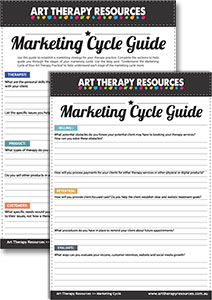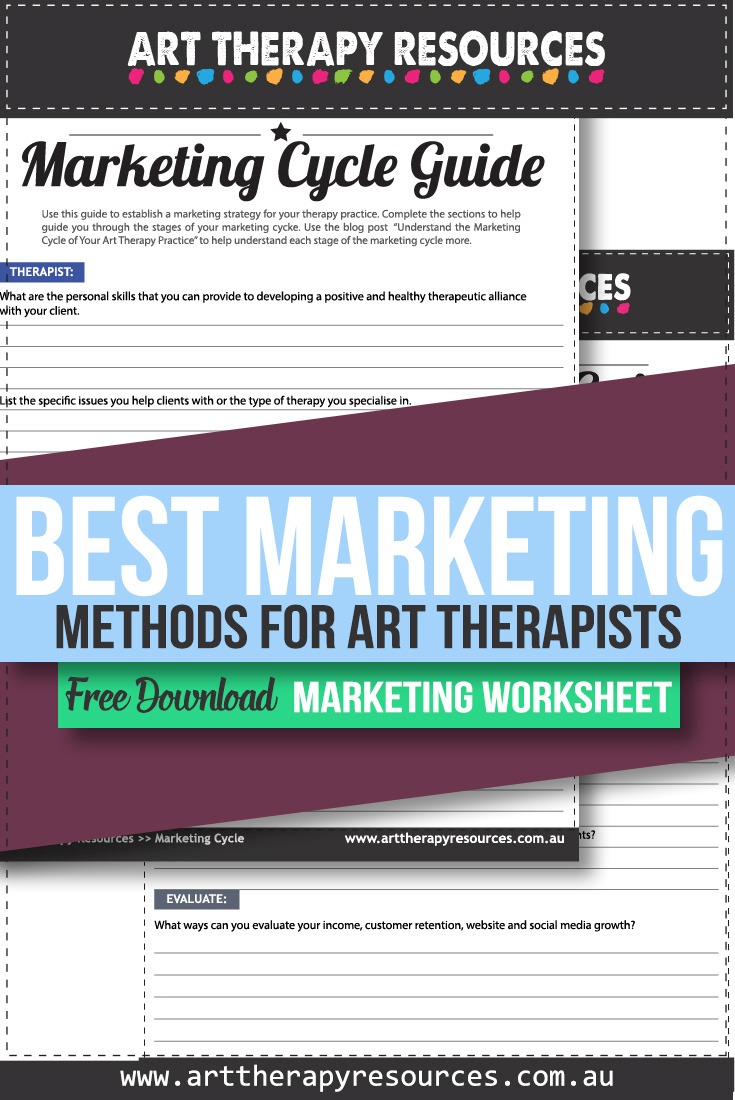WHY THERAPISTS NEED TO LEARN MARKETING
As a therapist, you may believe most of your time is spent on helping clients. If you own your own private practice, you are the person who is responsible for finding clients that you can help and for that reason, you need to learn marketing. Without marketing, your potential clients won’t know your private practice exists.
You can outsource your marketing efforts, particularly with the grunt work of scheduling social media or creating advertising graphics and sales copy. Before you get to the stage of executing your marketing strategy and outsourcing specific tasks, you need to create your marketing message that best describes what your art therapy practice is about and how your services can help clients.
As a private practice therapist, nobody knows your business like you. Your role as a business owner is integral in determining the most important parts of your marketing strategy, including:
- Your audience/clients
- Your message
- Ethical marketing
Developing your marketing strategy gives you an opportunity to refine aspects of your private practice including the products and services that you want to offer. This will then influence where and how you execute your marketing strategy to get the most effective results for your efforts. An understanding of marketing facilitates the process of your potential clients finding your therapy practice.
ETHICAL MARKETING FOR THERAPISTS
When we think about marketing we tend to think in terms of overt marketing campaigns designed to encourage us to buy clothes, drinks, cars or holidays. Marketing is also important in service-based industries such as art therapy and therapy in general. As many potential clients are reaching out in a vulnerable state, it’s important to ethically design an appropriate marketing message about the services that you offer.
Understanding your potential clients’ vulnerability is important when constructing your marketing message. It is important to be sensitive to your client’s distress and not use marketing language or techniques that show manipulation or influence based on exploiting those personal vulnerabilities. Your message should also be clear so that it clarifies the way you can help a potential client without unrealistic promises or guarantees. Unrealistic promises, guarantees, and a sense of urgency and finality are common techniques used in general marketing. These are the techniques an ethical therapist should avoid when developing and executing a marketing strategy.
If you belong to an association as part of your profession, you should check the ethical requirements before publishing your marketing materials to ensure that your marketing content is compliant.
MARKETING YOUR THERAPY PRACTICE
Marketing can make private practice owners feel uncomfortable. Often a private practice is centered around one person – YOU! This means that as much as you are marketing your private practice, you are also marketing yourself. For those who don’t like the spotlight put on themselves, this can be very confronting.
It can be difficult to construct a marketing message that sounds like you are tooting your own horn. The good news is that your marketing message doesn’t need to focus on you. You are an integral part of your marketing efforts, however, most potential clients are mostly looking for how you can help THEM.
In this regard, your marketing message should be focused on communicating with your potential client about their problems, along with the reassurance that you can help them. You provide this reassurance by explaining how your skills set and experience can help.
It’s important to remember that reassurance is simply addressing doubts and fears. It is not meant to act as a promise that your skill set is guaranteed to help your potential clients as previously mentioned about ethical marketing.
YOUR ELEVATOR PITCH
There is a marketing concept referred to regularly in the marketing industry called an elevator pitch. Essentially, it means how would you describe your business or skills in the time it takes for an average elevator ride. Could you persuade someone through your marketing message to engage your services within a few short sentences?
To effectively market your therapy practice it is helpful to develop an elevator pitch. This simple pitch, or statement, is something you can succinctly use for any networking, advertising, or at an educational event to explain what your business does and connect with the audience on the receiving end of your pitch.
People are often limited in time and attention span so having your marketing pitch fine-tuned to a short statement can ensure that your message is remembered in the future when someone might want to engage the services that you offer.
Below are some tips on creating your elevator pitch:
- Make it easy to repeat to someone within 15-30 seconds
- State who you are – eg. I am an art therapist with 5 years experience…
- What do you do – eg. I help clients with anxiety issues…, OR I help teens with eating disorders…., OR I work with couples who are dealing with infidelity…
- Give an example of what you do – I recently ran a group for teens using art therapy techniques to help build self-esteem. It was extremely rewarding for all parties and we are running two more groups this year.
Using the above examples, your summary statement might be:
I’m an art therapist and have been working with teens with eating disorders for the past 5 years. My practice recently ran group sessions for teens using art therapy techniques to help build self-esteem. It was extremely rewarding for all parties and we are running two more sessions this year.
This elevator pitch explains:
- Who you are – an art therapist
- What you do – help teens with an eating disorder
- A recent example – art therapy groups for teens and building self-esteem
- A statement inviting someone to use your services – the availability of future sessions
There is no formula to creating your elevator pitch and in fact, it may develop over time. Your ‘pitch’ should be written in the way you would normally speak so that the listener feels comfortable with hearing your message.
Your pitch should also be relevant to your audience. A potential therapy client may not want to know how you can develop group curriculum in a school setting, however, a local school may be more interested in hearing those details at a networking event or through a written communication.
BEST MARKETING METHODS
Below is a list of some of the most common and effective marketing methods available to art therapists and therapists in general:
NETWORKING
- With other therapists
- Therapist directories
- With doctors
- Through professional programs such as EAPs, rehabilitation etc
- With allied health professionals
- With local businesses
- Local media – print, radio, TV
- Community organizations
- School, universities, and colleges for contract work
ADVERTISING
- Social Media
- Google Adwords
- Traditional media – tv, radio, print
- Therapists directories
EDUCATOR
- Local events
- Public speaking
- Community events
- Media appearances
- Publishing website content
- Publishing content for others
ADDITIONAL READING
To learn more about marketing and how to effectively use marketing within your private practice, you can read some of our previous posts listed below:
- Understand the Marketing Cycle of Your Art Therapy Practice
- How to Plan Your Marketing Strategies
- Link List: Online Marketing Courses to Improve Your Marketing Skills
- How to Establish Your Business Network
- Professional Networking for An Art Therapist
- How to Build an Email List for your Therapy Practice
- How to Create a Free Offer to Build Your Email List
- How to Create an Annual Social Media Plan in 60 mins
FREE DOWNLOAD: Marketing Cycle Worksheet

BUILD YOUR ART THERAPY REFERENCE MATERIALS:
Pin this image to your Pinterest board.

SHARE KNOWLEDGE & PASS IT ON:
If you’ve enjoyed this post, please share it on Facebook, Twitter, Pinterest. Thank you!
